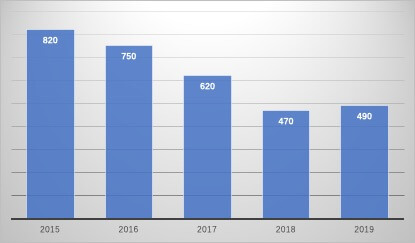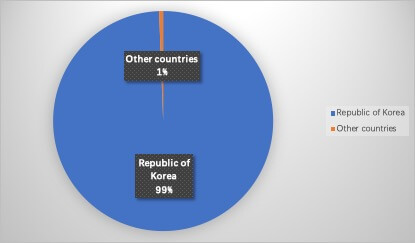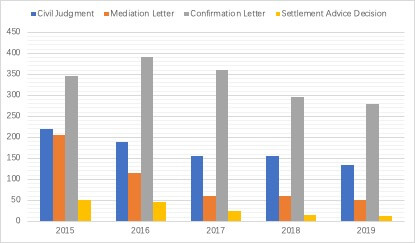
A recent survey of a Chinese local court shows how Chinese courts hear cases concerning the recognition and enforcement of foreign divorce judgments.
The survey report, entitled “Hearing and Analysis of Cases Applying for Recognition of the Effect of Divorce Judgments by the Courts of the Republic of Korea” (申请承认大韩民国法院离婚裁判效力案件的审理情况及分析), was published in “People’s Judicature” (人民司法) (No. 25, 2020). It was accomplished by a research group of the Intermediate People’s Court of Yanbian Korean Autonomous Prefecture ("Yanbian Court") in Jilin Province, including Judge Zhang Xiumei (张秀梅) (vice president of Yanbian Court), the group leader, Judge Mu Longgang (母龙刚) and other five judges.
We have summarized the highlights of the report as follows:
1. Background
Yanbian(延边) is a Korean autonomous prefecture in China bordering North Korea.
This prefecture is the predominantly Korean-populated region of China, with approximately 36% of this region's total population made up of Koreans, and 42% of China's Korean population living in this region.
Since the establishment of the diplomatic relation between China and South Korea, a large number of Yanbian residents have gone to South Korea to work and study. Many of them have taken advantage of marriage or fake marriage with Korean citizens to obtain visas to South Korea. However, such marriages usually do not last long. As a result, the number of cross-border divorce cases between China and South Korea has increased dramatically.
In these cases, some parties choose to file a lawsuit in a Chinese court, while others would like to take the case to a Korean court and then apply for recognition of the South Korean divorce judgment in the Chinese court.
Consequently, Yanbian Court has accepted a large number of such kind of applications, accounting for the highest number of recognition cases of foreign divorce judgments in China.
2. Caseload of Yanbian Court
From 2015 to 2019, Yanbian Court had accepted a total of 2,191 cases of this kind.
As we can see from the figure below, the caseload has been declining over the past five years.

The reason mainly lies in the fact that South Korea’s visa policy has become increasingly lenient for Chinese citizens, especially Korean residents of Yanbian, in recent years, so the parties do not have to obtain visas by way of fake marriages, causing a decline in the rate of cross-border marriage between Chinese and Korean citizens and a subsequent decline in the divorce rate.
Of all the applications for recognition of foreign divorce judgments accepted by Yanbian Court, 2178 were Korean judgments, accounting for 99.4%, while only 13 judgments were from other counties. See the figure below:

3. How Yanbian Court hears cases
(1) Accepting applications
With a large number of such cases and the fact that the vast majority of the parties are relatively old or less well educated, Yanbian Court, in order to improve efficiency and promote access to justice, has produced an application form template for such cases for applicants to fill out and has provided a guide on how to submit materials.
(2) Formality examination
As for the submitted materials, the applicants are generally able to provide the application, the original of the divorce judgment by the Korean court, or its certified Chinese translation.
However, the applicants often cannot provide a certificate to prove the effectiveness of the judgment, given Korean courts usually do not issue such certificate of entry into force of the judgment. In addition, the civil procedure system of South Korea is “Three Instances at Three Levels”, and Chinese judges cannot judge whether a judgment has entered into force solely based on the judgment. The certificate of confirmation issued by the judgment-making Korean court does not state when or whether the judgment has entered into force.
In other words, the effective date is generally not clarified in a Korean divorce judgment. As a result, Chinese judges need to ascertain the Korean Code of Civil Procedure to know the conditions and other necessary proof of the effectiveness of the to-be-recognized judgment.
In practice, most parties can provide the certificate of marriage issued by the Korean government for the party of Korean nationality, which will record the marriage registration and divorce registration of that party. After ascertaining the Korean civil law, Yanbian Court found that only after the divorce confirmation or the divorce judgment became legally effective, could the divorce of the parties be registered. Therefore, Yanbian Court holds that if the marriage certificate provided by the party records the marriage status of the parties as divorced, the certificate could be considered as proof that the divorce judgment has entered into force.
Therefore, generally speaking, if the applicant provides the application, the original judgment made by a Korean court or its certified Chinese translation (notarized and certified), and the marriage certificate issued by the Korean government department (notarized and certified), Yanbian Court can determine that the materials provided by the parties are complete and accept the case.
(3) Substantive examination
A. Types of instruments that can be recognized
There are mainly four types of legal instruments made by Korean courts that the applicants apply for recognition: civil judgment, mediation letter, confirmation letter, and settlement advice decision. The number of these instruments is shown in the figure below:

Civil judgment and mediation letter could be examined directly by Chinese courts according to judicial interpretation.[1] The Supreme People's Court (SPC) stated in a reply in 2003 that the confirmation letter could be examined, and confirmed in another reply in 2020 that the settlement advice decision could also be examined. [2] Up to this point, the four types of instruments can be subject to recognition.
B. Recognition of judgment on the nullity of marriage
Yanbian Court usually does not recognize civil judgments on the nullity of marriage made by Korean courts for fake marriages. The reasons are as follows: first, Chinese courts only accept cases relating to genuine marriage and divorce, and the recognition of judgments on the nullity of marriage does not fall within the scope of acceptance by Chinese courts; second, Chinese courts do not recognize the judgments on the nullity of marriage made by Korean courts based on reciprocity.
However, Yanbian Court also expressed that it had adopted a more conservative approach and hoped that the SPC could clarify how to handle such cases.
C. Whether the application should be served on the respondent
Yanbian Court holds that there is no provision for service of the application on the respondent and hearing of opinions in the procedural provisions on the recognition of foreign divorce judgments, plus, the applicant abroad is difficult to find. Therefore, the court takes the view that it is not required to serve the application on the respondents and hear their opinions.
D. Whether an overdue judgment can be recognized
Two years is the limitation period for a party to apply for recognition and enforcement of a foreign judgment, ruling, or arbitral award. However, the SPC has stated that the parties applying for recognition of foreign judgments or judgment items on the right confirmation such as identity or marital relations shall not be subject to the time limit. [3] Therefore, Yanbian Court adopts the view of the SPC.
4. Other experience
As Korean judges in Yanbian Court are usually fluent in Korean, Yanbian Court encourages its judges to visit the official website of Korean courts to search for instruments, thus helping them identify the authenticity of instruments and the time of entry into force.
There are different types, procedures and trial levels of divorce cases in South Korea, so the text used for the case number of judgments is also different. Given that there is no standard translation in Chinese, Yanbian Court has formulated the translation norms, which is conducive to accurately expressing Korean instruments in Chinese judgments.
References:
[1] 关于中国公民黄爱京申请承认外国法院离婚确认书受理问题的复函
[2] 关于中国公民申请承认外国法院和解劝告决定书等法律文书的请示的复函
[3] 沈德咏主编:《最高人民法院民事诉讼司法解释理解与适用》,人民法院出版社2015年版,第1421页。
Contributors: Meng Yu 余萌






